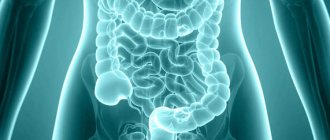Flatulence
– this is an excessive accumulation of gases in the gastrointestinal tract, which can be caused either by increased gas formation or problems with the removal of gases from the body. Gases, as a rule, accumulate either in the stomach or in the right or left bends of the colon.
Gases enter the digestive tract either through the mouth (thus, air is swallowed in small quantities when eating - with each swallow), or are produced during the digestion process. A significant volume of gases is also released when gastric juice is neutralized with soda (some patients with heartburn take soda just to neutralize the acid of the gastric juice, which irritates the gastric mucosa). In small quantities, gases enter the intestines through the bloodstream. Gases are eliminated mainly through the rectum. The volume of gases released in a healthy person varies quite widely. Flatulence is diagnosed when a person experiences discomfort due to an increased amount of gas in the stomach or intestines.
Manifestations of flatulence
With flatulence, people usually complain of bloating (a feeling of fullness and heaviness in the abdomen), as well as aching pain in the abdominal area. The pain can also be acute (so-called “gas colic”). The pain usually goes away or decreases after the gas has passed.
There are two possible manifestations of flatulence.
At first, the passage of gases is difficult. In this case, there is an increase in the abdomen as a result of bloating of the intestines. The main complaint is discomfort or pain in the abdominal area.
With the second option, the gases escape, but this process itself causes concern. This happens often, violently and is not always controllable. This condition can significantly complicate our lives. There may be no pain; patient complaints are usually formulated as “rumbling” or “transfusion” in the abdomen. Flatulence may also be accompanied by:
- belching;
- bowel problems (constipation or diarrhea);
- nausea;
- bad breath;
- decreased appetite;
- shortness of breath (breathing disturbance due to flatulence is called dyspeptic asthma
. The swollen intestines compress the diaphragm, preventing a normal inhalation).
Sometimes, with flatulence, manifestations from the cardiovascular system are observed: a burning sensation in the heart area, headache, irregular heartbeat, etc.).
What should I do to prevent bloating from appearing?
Simple rules to reduce the risk of flatulence:
- Eating should be slow, with thorough chewing of food, without distraction by extraneous actions.
- Avoid quick snacks on the go, smoking, and drinking alcohol.
- Limit the consumption of foods that increase gas formation.
- Avoid sugary carbonated drinks (there is nothing healthy in them).
- Drink enough clean water per day.
- Follow a proper diet (fried, fatty foods should not predominate)3.
Before a big feast or when overeating, it is better to take care of preventing bloating* in advance. To do this, you can take Creon® 10000 capsule with food or immediately after it. The active substances contained in the drug help natural digestion, reducing the risk of discomfort and heaviness after eating.
Causes of flatulence
Flatulence can occur for various reasons. In particular, they distinguish:
- nutritional flatulence
- occurs when eating foods that cause increased gas formation (legumes, cabbage, potatoes, brown bread, lamb), as well as highly carbonated drinks; - flatulence caused by digestive disorders
. It could be an enzyme deficiency. As a result of a lack of enzymes, a significant amount of undigested food enters the lower digestive tract. The processes of rotting and fermentation are activated, during which an increased amount of gases is released. Also, an excess amount of gases can be released when the balance of microorganisms in the intestines is disturbed (dysbacteriosis). Such conditions are often the result of serious diseases, so flatulence is a common symptom found in gastritis, duodenitis, pancreatitis, cholecystitis, hepatitis, cholelithiasis, etc. - flatulence caused by mechanical obstacles in the path of food
, for example, in the case of a tumor; - dynamic flatulence
- caused by disturbances in the motor activity of the gastrointestinal tract. Such disorders may be the result of intestinal surgery, acute infections or intoxication; - flatulence caused by circulatory disorders in the intestinal area ( circulatory flatulence
); - psychogenic flatulence
. Stress or nervous tension can lead to impaired intestinal motility, resulting in flatulence.
Medicines for bloating
To help combat bloating caused by a lack of digestive enzymes, medications containing enzymes similar to those produced by our body can help.
What should a drug “be able to do” to improve digestion?5
- overcome gastric juice without loss of effectiveness;
- distributed throughout the food bolus;
- quickly enter the intestines and become active;
- digest fats, carbohydrates, proteins.
It is difficult for tableted forms of enzymes to enter the intestines, unlike the tiny particles in the form of which Creon® is produced. The tablets should not be divided, crushed or chewed, as this leads to a decrease in the effectiveness of the active substance.
As a rule, to eliminate heaviness after eating and other unpleasant symptoms, 1 capsule of Creon® 100006 is enough. 10,000 is the number of units of lipase, the enzyme that is responsible for the breakdown of fats. There is no need to be afraid of this number. Our bodies produce up to 720,000 of these units during each meal7. Thus, the dose of Creon® is only a support for your own digestion. Creon® has no analogues in the group of enzymes, since no other drug is available in the form of minimicrospheres8.
Treatment of flatulence
Since flatulence can be a manifestation of serious diseases, if this symptom occurs frequently, it is necessary to undergo a thorough medical examination to determine the cause of flatulence.
If you complain of flatulence, you should contact a gastroenterologist or therapist. The doctor will issue directions for the necessary tests, determine the cause of flatulence and prescribe appropriate treatment. The course of treatment is prescribed depending on what is causing the flatulence. It may include a diet, as well as taking medications that stimulate intestinal motility and restore intestinal microflora. The main focus is on treating the disease that caused flatulence.
Espumisan
This is perhaps the fastest-acting drug for bloating and rumbling in the stomach. “Espumizan” does not have any effect on the digestive process, is not absorbed into the blood (“works” only in the intestinal lumen), and does not contain lactose and sugar. The active ingredient of the drug is simethicone. This is a safe remedy for bloating, so it can be used at any age. Doctors say that Espumisan does not develop addiction, so it can be used for a long course (more than 14 days). You can buy Espumisan in capsules and drops. The capsules are small in size, easy to swallow, and do not need to be washed down with water. The drug is safe for diabetics and people with lactose intolerance. The relative disadvantages of the product are its high cost and unnatural composition.
Espumisan
Berlin-Chemie/Menarini, Germany
Excessive formation and accumulation of gases in the gastrointestinal tract (flatulence, Roemheld syndrome, aerophagia, increased gas formation in the postoperative period);
preparation for diagnostic studies of the abdominal and pelvic organs (including ultrasound, x-ray studies); symptoms of excessive gas formation caused by functional dyspepsia; acute poisoning with detergents containing foaming agents (as an antifoam agent). from 235
5.0 1 review
3304
- Like
- Write a review
Sources
- Management of common gastrointestinal symptoms in the general population. A global view of heartburn, constipation, flatulence and abdominal pain/discomfort // Global practical recommendations of the World Gastroenterological Organization. - May, 2013.
- Hyun Jik Lee, Kyung Sik Park. Bloating [Electronic resource] // Korean Journal of Gastroenterology, December 2022.
- Max Schmulson. Understanding Bloating and Distension [Electronic resource] // International Foundation for Functional Gastrointestinal Disorders, 2013.
- Nayoung Kim, Dong Hyun Oh. Abdominal Bloating: Pathophysiology and Treatment [Electronic resource] // Journal of Neurogastroenterology and Motility, October 2013.
- Carly Gennaro, Helaine Larsen. Symptomatic Approach to Gas, Belching and Bloating with OMT Treatment Options [Electronic resource] // Osteopathic Family Physician, 2022.
Plantex
An excellent anti-bloating drug for those who value natural ingredients. Plantex is prescribed for intestinal colic and for its prevention. The active ingredient of Plantex is fennel fruit extract. Fennel is beneficial for the gastrointestinal tract because it contains essential oils, organic acids and vitamins. The product relieves pain during flatulence and helps gases escape. You can buy Plantex in bags containing light brown granules. They are dissolved in 100 ml of warm boiled water and stirred until completely dissolved. The active substances of the drug are completely absorbed and quickly relieve bloating. The disadvantage of this product is that it contains sugar.
Plantex
Lek d.d., Slovenia
As a preventive and therapeutic agent in children from 2 weeks of age and older: - to eliminate spastic pain in the intestines with mild digestive disorders;
- when switching from breastfeeding to other types of nutrition. from 285
5.0 1 review
1719
- Like
- Write a review
First aid
First aid for the appearance of a hard abdomen is carried out only after identifying the possible cause or provoking factors. If symptoms develop due to overeating, it is necessary to provide the patient with rest and use drugs that replace natural pancreatic hormones, as well as enterosorbents. If possible, it is recommended to have a bowel movement, as this will make you feel better.
During menstruation, it is allowed to use medications that have an analgesic or anti-inflammatory effect. First aid for pathological causes of a hard abdomen includes:
- Providing the patient with complete rest and taking a comfortable position that relieves pain.
- Limit the use of medicines, food, and water. This can lead not only to a deterioration in well-being, but also to difficulty in further diagnosis.
- Calling an ambulance.
- Freeing the stomach from constricting clothing.
- Applying a heating pad with ice or any cold object to the area of greatest pain. This will reduce possible blood loss and also slow down the growth of the pathogenic form with a decrease in the severity of pain.
When to see a doctor
This is typical for a woman who experiences bloating during hormonal fluctuations associated with her menstrual cycle and menopause. In most cases, bloating that clears up on its own is not a cause for concern.
However, in cases where the bloating is prolonged and painful, a woman should talk to her doctor. Painful bloating that lasts for several weeks may indicate other medical conditions that should be diagnosed by a medical professional.










